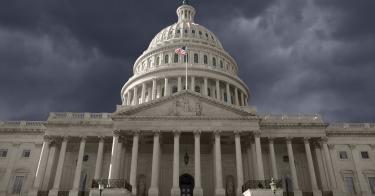With linked arms, Republicans and Democrats are marching our kids into a world of higher taxes and fewer economic opportunities. The House this week approved a two-year, $322 billion spending increase. The Senate may soon follow suit.
If this happens – and the president signs off – this profligate spending would guarantee the return of trillion-dollar annual deficits, something not seen since the Obama-era recession.
Unless Congress changes direction, our debt will balloon from today’s unprecedented level of $22 trillion to more than $37 trillion in 10 years. That’s nearly two times what our entire economy produces in a year.
Such massive debt can’t help but threaten funding for federal programs – from national defense to Social Security, to safety-net programs for the poor. Next year, according to the Congressional Budget Office, Washington will spend more on interest payments than on Medicaid. In six years, spending on interest will eclipse the entire defense budget.
Already, our accumulated debt is hobbling the economy. Numerous studies show that countries with debts as large as their economies experience slower growth, depressing wages and limiting new economic opportunities. The fear of debt-driven financial instability makes investors less likely to take risks on new innovative ideas such as long-shot therapies to treat cancer or new strains of crops that will flourish in hotter, dryer climates.
Governments are also less equipped to manage the next crisis when their balance sheet is already stretched to the point of breaking.
Some pundits have been quick to blame the 2017 tax cuts for America’s growing debt. They appear to believe that the federal government can tax its way out of its fiscal problems. But repealing the tax cuts would cover less than 7 percent of the current policy deficit and cost the average worker $26,906 in lost income over 10 years.
We could also raise taxes on the rich, right? Consider Rep. Alexandria Ocasio-Cortez’s proposal to slap people making over $10 million with a 70 percent tax rate. Her plan would only raise $19 billion in 2019, about 6 percent of the most recent budget deal and only 2 percent of this year’s projected deficit. The 70 percent tax could actually lose revenue if all income (including capital gains) were taxed at a high rate because investors would simply stop actively investing.
Even adding in other soak-the-rich proposals – such as a “wealth tax” or a tax on financial transactions – would only cover about 15 percent of the likely deficit over the next 10 years.
If Washington is unwilling to cut spending, Americans can get a glimpse of our financial future in Europe. There, workers toil two months longer than we do to pay their tax bill.
The only feasible way to close the deficit through taxation is by laying significant tax hikes on middle and lower-income Americans. Put another way, Congress cannot tax itself out of the budget hole it is digging without raising taxes on Americans who are already struggling to make ends meet.
Currently, Congress chooses to budget only about 30 percent of federal spending. The rest is on auto-pilot, consumed by mandatory entitlement programs (Medicare, Medicaid, Social Security) and interest on the debt. By 2041, all revenue will go toward entitlement spending and interest, leaving no money for the military, no money for infrastructure or education or food stamps. No money for anything else.
There are still reasonable paths to budget reform that include reforming entitlements to account for people living longer, healthier lives, removing duplicative and ineffective programs and encouraging competition in health care markets to allow more choices, better access, and lower costs.
The U.S. fiscal crisis is not likely to come crashing down around us all at once, as it did in Greece or Argentina. Instead, the current generation will just methodically march young Americans into a world of high taxes, high debt, and less opportunity.
This piece originally appeared in Fox News



